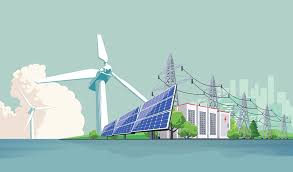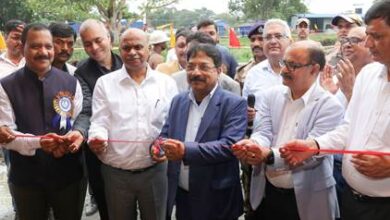Call To Triple Global Renewable Energy Capacity By 2030
Renewable energy is already transforming communities around the world

Last week, G20 leaders pledged to triple global renewable energy capacity by 2030, in a bid to accelerate the clean energy transition and fight climate change. Now The Global Renewable Alliance (GRA) has prepared an open letter from over 200 organisations calling for a target at COP28 to triple renewable energy capacity to at least 11,000 GW by 2030.
This open letter is being published on the occasion of the UN General Assembly and New York Climate Week in September 2023 by a global group of climate and energy organisations.
We, a global group of 200 organisations, emphatically call for world leaders and Parties to the Paris Agreement to agree on a global target to triple renewable energy capacity to at least 11,000 GW by 2030 at COP28 this year. A step change this decade in renewable energy growth, combined with an increase in energy efficiency, will be the fastest and most cost efficient way to decarbonise the global economy. It is one of the most impactful commitments that the global community can undertake now to secure a liveable future for all.
A global target to 2030 sends a clear signal to governments, industry, investors and civil society on the unprecedented scale and speed of renewables deployment required over the next seven years to limit global warming to a 1.5°C pathway. It also builds upon the recognition of the urgency to rapidly transform energy systems in this critical decade of action, secured at COP27 last year.
The COP28 Presidency, policymakers and heads of international energy agencies are already convening around a shared target to triple global renewable energy capacity to at least 11,000 GW by 2030. That means accelerating build-out of wind power, solar power, hydropower and geothermal power, which would set the stage for technologies like long-duration storage and green hydrogen to take off. This would ensure energy systems are not only clean, but secure and just and in turn, form the foundation of a net zero global energy system by 2050.
Renewable energy is already transforming communities around the world : powering homes, cars and factories with clean electricity; generating millions of green jobs; and attracting public and private capital to propel economic growth. Tripling this activity represents an enormous opportunity to reduce the loss and damage for nature and people wrought by harmful climate change, and set the world on a path to sustainable, inclusive and climate-resilient growth.
While each country and region will adopt a nationally determined approach to this common target, there are universal enablers for accelerating renewable energy. The renewables industry, investors and other key stakeholders stand ready to work together with governments to scale up deployment, however, urgent action in the following areas is needed to implement this global target:
● Commit to ambitious energy transition plans with concrete interim milestones to 2030 and beyond, which will allow the renewables, storage, and ancillary industries to plan for efficient supply chain development. These plans should be reflected in Nationally Determined Contributions and enshrined in national policy frameworks, including ambitious technology targets with a frequent, well-planned schedule of sizable volumes of capacity for procurement.
● Urgently streamline permitting schemes for grid-scale renewable energy projects as well as long-duration energy storage and renewable hydrogen projects. Policymakers can consider implementing mandated lead times for the administrative, licensing and environmental permitting stages of project development, as well as a “one-stop shop” model for authorities.
● Urgently invest in grid action plans which rapidly build out electricity grids and heat systems for integration of large volumes of renewables and long-duration energy storage solutions. As grid infrastructure often requires a longer lead time than renewable projects, the lack of available grid connections and transmission poses a significant bottleneck to the scale-up of renewable energy.
● Foster multilateral renewable energy partnerships and trade agreements in support of the energy transition, to improve collaboration on shared challenges, enhance North-South technology transfer, expand South-South cooperation and solutions, and contribute to a just and equitable transition in developing economies.
● Maximise the potential for a nature-positive energy transition by including renewables deployment plans and targets as part of wider environmental and biodiversity strategies on land and in the sea.
● Strengthen commitment to Sustainable Development Goal 7 to achieve a just and orderly energy transition that leaves no one behind, with continued action towards providing affordable, reliable, sustainable and modern energy for all by 2030.
● Policymakers should also consider other key enablers: Implementation of robust sustainability and technology standards/certification, creation of a level playing field in energy subsidies, incentivising flexibility and dispatchability in electricity markets, recognising indigenous and land rights when planning renewable deployment, facilitating corporate procurement of renewable energy and implementation of the global rulebook on robust carbon pricing.
Tripling renewable energy capacity by 2030 represents a “quantum leap in climate action.” requires governments to work together with industry and the finance community on fast-tracking policy and regulation to expand project pipelines, usher in new waves of investment to the energy sector and build infrastructure, including transmission lines and supply chain hubs. It requires international solidarity to ensure financial and technical resources are mobilised to support developing economies in the global energy transition. Finally, it requires a holistic approach to energy system transformation, including doubling progress on energy efficiency by 2030 and undertaking wide-scale electrification.
Last year, power sector emissions reached an all-time high and the UN assessed that no country is currently on a credible pathway to 1.5°C. It is clear we need a profound course-correction of the energy system in this decade, and time is running out. The letter urged world leaders and Parties to the Paris Agreement to make a firm commitment to tripling renewable energy capacity to at least 11,000 GW by 2030 at COP28 this year. We are ready to work side-by-side with governments, industry, investors and civil society to collectively take actions, move faster and scale up renewables.
A global target to 2030 sends a clear signal to governments, industry, investors and civil society on the unprecedented scale and speed of renewables deployment required over the next eight years to limit global warming to a 1.5°C pathway. It also builds upon the recognition of the urgency to rapidly transform energy systems in this critical decade of action.
Hence, a global group of 200 organisations, emphatically call for world leaders and Parties to the Paris Agreement to agree on a global target to triple renewable energy capacity to at least 11,000 GW by 2030 at COP28 this year.
The writer of this article is Dr. Seema Javed, an environmentalist & a communications professional in the field of climate and energy




